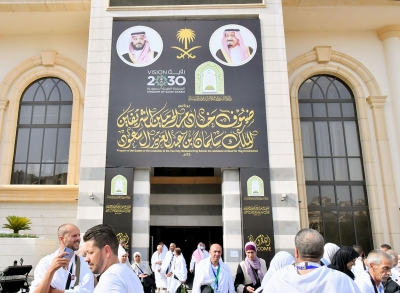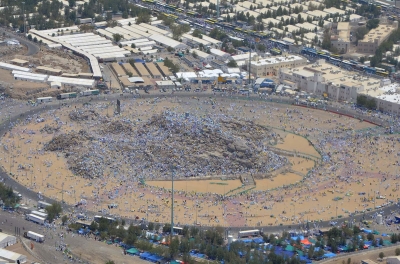

Nutrition During Hajj Season is one of the services provided by the Kingdom of Saudi Arabia to the pilgrims. It is overseen by the Ministry of Hajj and Umrah, the Ministry of Health, the Saudi Food and Drug Authority, Holy Makkah Municipality, and the General Food Security Authority, in collaboration with licensed catering companies and kitchens, to provide food for the visitors of the Grand Mosque and ensure their health and safety during the performance of Hajj rituals.
The duties of the Holy Makkah Municipality to secure nutrition during Hajj season
The Holy Makkah Municipality issues seasonal licenses and oversees the qualification of companies operating in the field of nutrition to provide meals for pilgrims safely. It applies quality standards to ensure food safety in accordance with health standards. The municipality monitors nutrition and catering providers in Hajj and determines their operational capacities. It also prepares field teams to monitor the catering system, including inspectors, technicians, and laboratory specialists. They inspect qualified catering facilities, collect and analyze food samples, conduct examinations using rapid testing devices to ensure the validity of ingredients and the safety of utensils used, and supervise raising awareness of workers in these facilities.
The municipality adopts a mechanism to provide meals, that starts from sourcing and preparing meals, storing them in refrigeration and freezing rooms at specific temperatures, then thawing the meals by heating them using electric ovens with specified specifications, and finally transporting them through equipped vehicles for distribution to pilgrims.
The municipality oversees markets and food retailers and establishes specialized laboratories for sample testing. Additionally, it organizes field monitoring committees to oversee markets and food retailers, inspect items served and displayed in restaurants and kitchens, and address negative occurrences.
The role of the Saudi Food and Drug Authority in nutrition during Hajj season
The Saudi Food and Drug Authority participates in serving pilgrims during Hajj season by monitoring shipments and consignments accompanying pilgrim missions at King Abdulaziz International Airport in Jeddah, Prince Mohammed Bin Abdulaziz International Airport in al-Madinah al-Munawwarah, as well as Jeddah Islamic Port and land ports.
The authority inspects food establishments within the jurisdiction of the Holy Makkah Municipality and al-Madinah al-Munawwarah Province, in cooperation with the Ministry of Municipalities and Housing. Additionally, it conducts health inspections on sacrificial animals slaughtered in the slaughterhouses located in Mina, food services provided in hotels hosting pilgrims, and food transportation means entering Makkah al-Mukarramah. It holds guidance workshops for food handlers in catering kitchens, and raises awareness among pilgrims about food safety and how to preserve it.
Tasks of the Ministry of Health in nutrition during Hajj season
The Ministry of Health provides a range of dietary regimes during Hajj season tailored to pilgrims' medical conditions as per their conditions and diets prescribed by specialists. This is done through cooked meals and dietary supplements monitored in intensive care units and other inpatient departments by clinical nutritionists. The Nutrition Committee at the Ministry of Health oversees the nutrition status in hospitals of the holy sites through nutrition departments and dining halls under the supervision of nutritionists, ensuring compliance with health regulations and proper practices in food preparation and handling.
The role of the General Food Security Authority during Hajj season
The role of the General Food Security Authority is to raise awareness about the importance of food security and promote proper consumption practices. The General Food Security Authority, represented by the National Program for Reducing Food Loss and Waste, organizes awareness campaigns during Hajj season to increase awareness among the pilgrims and Hajj and catering campaigns about the significance of reducing food waste in Makkah al-Mukarramah and the holy sites.
Suitable meals for nutrition during Hajj season
Pilgrims need to pay attention to the quality and quantity of food to replenish expended energy, maintain food hygiene, and avoid consuming exposed food susceptible to contamination, to avoid illness. The relevant entities recommend that pilgrims consume dry meals such as dates, bread (whole grain and whole wheat), fruits, milk, or yogurt as they provide a variety of essential nutrients. Additionally, they recommend drinking water and juices to prevent dehydration, while reducing intake of stimulant beverages and salty food to avoid high blood pressure and minimize thirst.
Related quizzes

